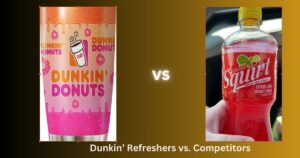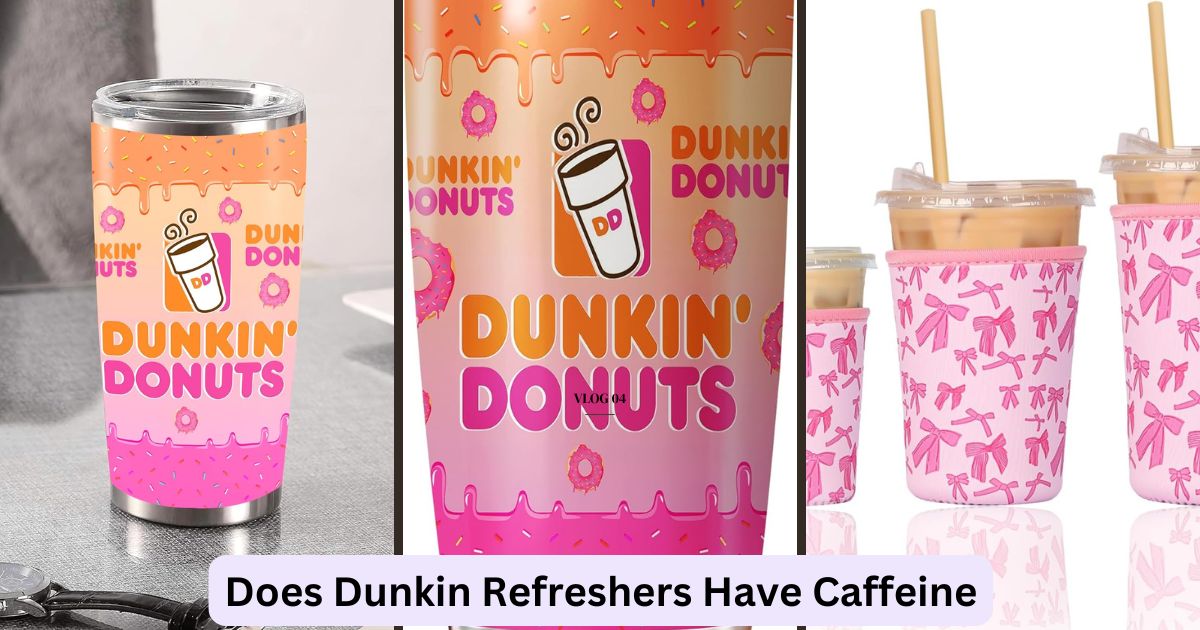Last updated on July 25th, 2025 at 02:29 am
Does Dunkin Refreshers Have Caffeine?
Yes — every Dunkin Refresher contains caffeine, and it might be more than you think.
If you’re sipping one for the fruity flavor, you could be unknowingly adding over 100 mg of caffeine to your day.
That’s because Dunkin uses a green tea base combined with caffeine extract to give their Refreshers a subtle energy boost — even though they don’t taste like typical caffeinated drinks.
But how much caffeine is actually in each size? And how does it compare to coffee, tea, or energy drinks?
This guide breaks it all down: exact caffeine amounts by size, flavor variations, how to reduce your intake, and answers to the most common questions.
Whether you’re caffeine-sensitive, monitoring your intake, or just curious — you’ll get clear, accurate answers right here. Keep reading.
What Is in a Dunkin Refresher?
If you’ve ever wondered what gives Dunkin Refreshers their crisp taste and subtle kick, it’s not just fruit flavor.
These drinks are built on a green tea base packed with B-vitamins and a fruit concentrate infused with green tea extract — the true source of their caffeine.
Green Tea Base & B‑Vitamins
Every Dunkin Refresher starts with a lightly caffeinated green tea base.
This blend includes Vitamin B3, B5, B6, and B12, offering a mild energy lift without the harsh crash you might get from coffee.
Fruit Concentrate with Green Tea Extract
The fruity flavor comes from a concentrated juice mix — think strawberry, watermelon, mango, or peach.
But here’s the catch: these concentrates are infused with green tea extract, adding another layer of caffeine that many people overlook.
Reddit users have flagged this in confusion, and platforms like Tasting Table and Facebook groups confirm: even if it tastes like juice, it’s caffeinated.
Caffeinated by Default — No Decaf Option
Looking for a caffeine-free Refresher?
Unfortunately, you won’t find one. All Dunkin Refreshers come caffeinated by default. That includes coconut milk and lemonade versions — unless you ask for a custom base like plain lemonade only.
Parents and caffeine-conscious customers often assume Refreshers are safe for teens or caffeine-sensitive individuals. But as No Cheat Day Needed points out, that’s not always true.
Read Also:
👉 Does Squirt Have Caffeine?
👉 Does Gatorade Zero Have Caffeine?
👉 Does HI-C Have Caffeine?
Caffeine Content by Size
Let’s break down the numbers. Because the caffeine in Refreshers varies by size — and it adds up fast.
Small (16 oz): ~66 mg
A small Refresher may seem light, but it still delivers about 66 mg of caffeine.
That’s almost as much as a can of Diet Coke — and more than many iced teas.
TikTok creators, Tasting Table, and Corner Coffee Store all confirm this as a standard baseline.
Medium (24 oz): ~99 mg
Order a medium, and you’re getting nearly 99 mg of caffeine — close to a cup of hot coffee.
Guides from Tartelette and No Cheat Day Needed emphasize how this size often surprises customers who think they’re just sipping a fruity drink.
Large (32 oz): ~132 mg
Going big? Expect a big caffeine hit.
A large Dunkin Refresher contains around 132 mg of caffeine, putting it in the range of some energy drinks.
Tartelette, Tasting Table, and Corner Coffee Store all report similar numbers.
Variations in Reported Values
Not all sources agree on the exact caffeine amount.
Official Dunkin info shows ranges from 114 to 135 mg, depending on the batch and flavor. Sites like Additive and social discussions on Facebook reflect this inconsistency.
Bottom line? Don’t rely on guesswork — know what’s in your cup.
How It Compares to Other Drinks

Worried that your Dunkin Refresher is sneaking in more caffeine than expected? You’re not alone. Let’s compare it to other popular drinks — so you can see how it really stacks up.
vs. Unsweetened Iced Green Tea (~70 mg)
Think Refreshers are lighter than tea? Not by much.
A small Refresher (~66 mg) is nearly identical to unsweetened iced green tea from Dunkin (~70 mg).
Better Homes & Gardens and Tasting Table confirm they’re almost caffeine twins.
The difference? Refreshers add fruit flavor and extract, while tea is more subtle.
Verdict: If you’re replacing iced tea with a Refresher, caffeine-wise, it’s a near swap.
vs. Hot Coffee / Cold Brew / Energy Drinks (144 mg vs. 260–347 mg)
Here’s where it gets interesting.
A medium hot coffee at Dunkin delivers around 144 mg of caffeine.
Their cold brew or SPARKD Energy Drinks? Even stronger — ranging from 260 to 347 mg.
Axios reports these drinks are designed to energize fast, unlike Refreshers, which offer a more gentle kick.
Verdict: Refreshers are lower in caffeine than coffee or energy drinks, but still pack a punch.
Customizing Caffeine Level
Want a Refresher with less caffeine? You’ve got options.
Swapping Green Tea for Lemonade or Coconut Reduces Caffeine
The default base — green tea — contains caffeine.
But you can ask for a base swap:
Lemonade
Coconut milk
Both cut the caffeine because they lack green tea extract.
Corner Coffee Store and user threads on Facebook confirm that this simple switch brings a noticeable difference.
How Much the Caffeine Drops (~68–91 mg for Medium Lemonade)
Here’s what a base swap actually does:
Medium Lemonade Refresher: ~68–91 mg, depending on flavor.
That’s a 10–30% drop from the regular green tea base.
According to Tasting Table, the fruit concentrate may still contain some caffeine, but it’s much lower overall.
Tip: For the lightest option, go for lemonade + light ice in a small cup.
Unique Caffeine Sources:
👉 Caffeine in Chocolate Covered Coffee Beans
Health & Safety Considerations
Moderation matters — especially with caffeine.
Recommended Max 400 mg/Day for Adults
According to Dunkin Donuts and Better Homes & Gardens:
Healthy adults can safely consume up to 400 mg/day.
That’s about 3–4 medium Refreshers — but remember, caffeine can add up fast with other drinks.
Teen Limits (~100 mg/Day)
Parents.com warns: caffeine guidelines for teens cap at 100 mg/day.
That means:
A small Refresher (~66 mg) is okay.
A medium or large may go over the line — especially if paired with other caffeinated drinks.
Pro tip: Always check size and flavor before ordering for kids or teens.
Potential Side Effects: Jitteriness, Sleep Issues, Digestion
Even moderate caffeine levels can affect sensitive individuals.
Watch for:
Jitters or anxiety
Trouble sleeping
Stomach discomfort or frequent urination
If any of these hit, try switching to lemonade base or scaling down your drink size.
Seasonal & New Flavors with Caffeine
Dunkin Refreshers aren’t just about energy — they’re about flavor. And the menu evolves with the seasons.
Let’s break down the latest flavors and how much caffeine each one delivers.
New Pink Spritz (~99 mg, 29 g sugar)
Dunkin’s newest hit, the Pink Spritz Refresher, tastes light — but it’s packing caffeine.
A medium Pink Spritz contains around 99 mg of caffeine.
It also includes 29 grams of sugar, making it one of the sweeter options.
EatingWell and Tasting Table confirm that this flavor still uses a green tea base, plus fruit concentrate — both contribute to caffeine content.
Quick tip: Great flavor, but pair it with water if you’re watching caffeine or sugar.
Raspberry Watermelon, Mango Pineapple Seasonal Shifts
Dunkin often rotates its Refresher flavors throughout the year.
Recent or returning options include:
Raspberry Watermelon
Mango Pineapple
Strawberry Dragonfruit
Peach Passionfruit
While the flavor changes, the caffeine levels stay roughly the same:
~66 mg (small)
~99 mg (medium)
~132 mg (large)
What changes most is sugar content, not caffeine. Check the nutrition info each season for exact numbers.
Conclusion
Yes — Dunkin Refreshers do have caffeine. And depending on the size, you could be sipping anywhere from 66 mg to 132 mg per drink.
Want less caffeine? Swap the green tea base for lemonade or coconut milk — it’s the easiest way to lower your intake without losing flavor.
Remember, caffeine adds up fast. Stick to 1–3 Refreshers per day max to stay within safe limits.
Now you know exactly what’s in your cup — and how to control it.
Use this guide next time you order, and make your Refresher work for you — not against you.
FAQs
Here are the most common questions people ask about Dunkin Refreshers — with clear, no-fluff answers.
Q: Do Refreshers have caffeine?
A: Yes. Dunkin Refreshers use a green tea base and green tea extract, both of which contain caffeine.
Q: Can I get a caffeine-free Refresher?
A: Not officially. But you can substitute the green tea base with lemonade or water to lower the caffeine significantly.
Q: Which size has the least caffeine?
A: A small (16 oz) Refresher has about 66 mg of caffeine — the lowest standard option.
Q: Are lemonade or coconut Refreshers caffeine-free?
A: No — they still contain fruit concentrate with caffeine. But they have less caffeine than the green tea versions.
Q: How many Dunkin Refreshers can I safely drink per day?
A: Adults should stay below 400 mg of caffeine daily. That means no more than:
4 small
3 medium
2 large
Teens should stay under 100 mg, so one small max is best.
Q: How does a Refresher compare to coffee?
A: A medium Refresher has around 99 mg of caffeine — slightly less than a small hot coffee from Dunkin.
It’s smoother, fruitier, and easier to sip — but still energizing.

Akash is our go-to expert on all things drinks — from soft drinks and sparkling water to coffee, tea, and energy beverages. With years of hands-on research, label analysis, and taste testing, he dives deep into caffeine content, ingredients, and brand comparisons to help readers make smarter choices. Whether you’re checking if a soda has caffeine or exploring healthier drink alternatives, Akash brings trusted, evidence-based insights with every article.. Read more about him here.

